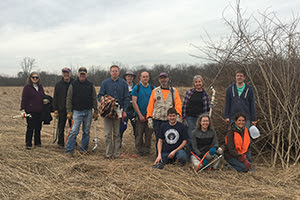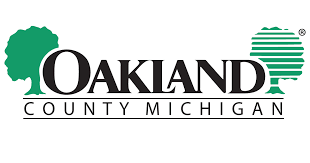Here are a few ways to get involved in taking care of Michigan’s natural resources in October. For more opportunities to volunteer, contribute and provide input, visit Michigan.gov/DNRVolunteers.
 Several state parks in southern Michigan will host volunteer stewardship workdays in October. Volunteers are needed to help with removing invasive plants that threaten high-quality ecosystems in the parks. Several state parks in southern Michigan will host volunteer stewardship workdays in October. Volunteers are needed to help with removing invasive plants that threaten high-quality ecosystems in the parks.
Please note that preregistration is required for all volunteer workdays, and participation may be limited due to social distancing requirements.
Although these are outdoor programs and proper social distancing of at least 6 feet is required, participants still are encouraged to wear face coverings as an added precaution.
Workdays will take place:
- Saturday, Oct. 3, 10 a.m. to 1 p.m. at Algonac State Park (St. Clair County).
- Sunday, Oct. 4, 10 a.m. to 1 p.m. at Highland Recreation Area (Oakland County).
- Saturday, Oct. 10, 9 a.m. to noon at Bald Mountain Recreation Area (Oakland County).
- Sunday, Oct. 11, 10 a.m. to 1 p.m. at Waterloo Recreation Area (Washtenaw County).
- Saturday, Oct. 17, 9 a.m. to noon at Belle Isle Park (Wayne County).
- Sunday, Oct. 18, 10 a.m. to 1 p.m. at Brighton Recreation Area (Livingston County).
- Saturday, Oct. 24, 10 a.m. to 1 p.m. at Island Lake Recreation Area (Livingston County).
- Sunday, Oct. 25, 10 a.m. to 1 p.m. at Pinckney Recreation Area (Washtenaw County).
- Saturday, Oct. 31, 10 a.m. to 1 p.m. at Highland Recreation Area (Oakland County).
More details about each workday can be found on the DNR volunteer events calendar. |
 The DNR welcomes public input on its plans for Michigan’s 4 million acres of state forest. The DNR welcomes public input on its plans for Michigan’s 4 million acres of state forest.
Because of COVID-19 precautions, the format has changed for 2020. Rather than hosting face-to-face open houses, people will be asked to offer input online.
“We value public input, and we want to continue it while maintaining safe social distances,” said Jeff Stampfly, acting chief of the DNR’s Forest Resources Division.
Here is how the process will work this year.
Go to Michigan.gov/ForestInput and click on the interactive map. Zoom in to your area of interest. As you zoom in, more details will appear. Sections of forest – referred to as “compartments” – under review for work to be done in 2022 are highlighted in bright green. Click anywhere within the compartment, and a pop-up screen will appear with more information.
You may submit comments by email or schedule a telephone appointment with a DNR staffer to discuss your comments or concerns during specific time periods in each management unit. Comment periods taking place in October include:
- Shingleton: now through Oct. 1; contact Bob Burnham, 906-452-6227, ext. 240.
- Grayling: now through Oct. 1; contact Thomas Barnes, 989-348-6371, ext. 7440.
- Crystal Falls: now through Oct. 6; contact Dan McNamee, 906-875-6622.
- Newberry: now through Oct. 15; contact Keith Magnusson, 906-291-0120.
- Escanaba: now through Oct. 21; contact Eric Thompson, 906-786-2354, ext. 142.
After public input is received and considered, final decisions will be made at DNR staff meetings known as compartment reviews. The public is welcome to listen to this year’s virtual meetings over the phone. Contact the listed unit manager for details of joining a compartment review phone call.
For more information on open houses, compartment reviews and instructions for using the interactive map, go to Michigan.gov/ForestInput. |
 Mountain biking or snowmobiling on scenic forest trails, going afield for the state’s time-honored hunting tradition, bird watching in wetland areas – these and countless other ways to enjoy Michigan’s great outdoors are available across the state thanks in part to the careful, thoughtful way the DNR strives to take care of Michigan’s public lands. Mountain biking or snowmobiling on scenic forest trails, going afield for the state’s time-honored hunting tradition, bird watching in wetland areas – these and countless other ways to enjoy Michigan’s great outdoors are available across the state thanks in part to the careful, thoughtful way the DNR strives to take care of Michigan’s public lands.
The DNR is responsible for nearly 4.6 million acres of public lands owned by Michigan residents – state parks, trails, game and wildlife areas, forests and developed facilities such as boat launches or fish hatcheries. In 2013, the DNR created a public land strategy to guide public land ownership and ensure maximum benefit for residents and the state’s natural resources.
Right now, the department is in the process of updating that strategy and is encouraging the public to review and provide feedback on newly released draft components. Two upcoming DNR-hosted virtual meetings (Sept. 30 and Oct. 1) offer the opportunity to learn more about the strategy, ask questions and provide feedback.
Learn how to participate in the public meetings.
The draft goals, strategies, measurable objectives and key actions – the critical framework for the plan’s next steps – along with other sections of the land strategy are now available for review at Michigan.gov/PublicLands and will be discussed in further detail during the virtual meetings. If you’re unable to participate, the public meetings will be recorded and made available for viewing on this page, along with additional updates that will be posted throughout the process.
Feedback can be sent to [email protected] through Oct. 31. |
 How do you use and enjoy Michigan’s nearly 4 million acres of state forests? How important are forests to you? How do you use and enjoy Michigan’s nearly 4 million acres of state forests? How important are forests to you?
We want to know! We’re conducting a public survey to help guide creation of a new 10-year plan to keep state forests healthy and productive for generations.
Take the survey and offer your input. It will be available online until Oct. 23.
Periodic planning helps forestry professionals respond to factors that affect the forest, such as climate change, invasive pests and fire. Plans made by the DNR always include using state forests for a variety of purposes, from recreation to wildlife habitat to timber harvests.
The State Forest Management Plan includes state forests in the northern Lower Peninsula and the Upper Peninsula and was last revised in 2013.
Additional opportunities for comment and engagement will be shared at Michigan.gov/RegionalForestPlans. |
 Veteran trail users in Michigan know the state is richer than most, with 13,000 miles of state-managed trails, thousands of miles of local, county and federally managed trails, and more rail-trail miles than any state in the nation. We’re looking for input – from trail lovers of all experience levels – on the management and future development of these valuable resources. Veteran trail users in Michigan know the state is richer than most, with 13,000 miles of state-managed trails, thousands of miles of local, county and federally managed trails, and more rail-trail miles than any state in the nation. We’re looking for input – from trail lovers of all experience levels – on the management and future development of these valuable resources.
Oct. 1-22, we’ll host a series of virtual meetings where you can learn about our draft vision and goals for Michigan’s trails system (developed with assistance from the Michigan Trails Advisory Council) and share your own ideas. The meetings are the next step in the DNR’s effort to update the 2013 Statewide Trails Plan, an 18-month process that started last fall and will be completed by summer 2021.
Seven regional or use-specific meetings are scheduled:
- Thursday, Oct. 1, 6 p.m. (Upper Peninsula region).
- Tuesday, Oct. 6, 6 p.m. (motorized trails).
- Thursday, Oct. 8, 6 p.m. (northern Lower Peninsula region).
- Tuesday, Oct. 13, 6 p.m. (southwestern Lower Peninsula region).
- Thursday, Oct. 15, 6 p.m. (southeastern Michigan region)
- Tuesday, Oct. 20, 6 p.m. (nonmotorized trails).
- Thursday, Oct. 22, 6 p.m. (water trails).
Due to COVID-19 public health and safety concerns, all meetings will be hosted virtually. People are encouraged to attend any meetings that align with their preferred destinations or pursuits. Registration for all meetings is required. To learn more about the planning process, register for a virtual meeting or complete the online trails survey, please visit the public participation section of the MichiganTrailsPlan.org website.
Anyone unable to participate in the virtual meetings is encouraged to review the draft vision and goals, other resources and meeting records (as they become available) and share feedback via the online survey. Recordings of each meeting, when completed, also will be posted at the webpage noted above. |
|
|
|
|




 Several state parks in southern Michigan will host volunteer stewardship workdays in October. Volunteers are needed to help with removing invasive plants that threaten high-quality ecosystems in the parks.
Several state parks in southern Michigan will host volunteer stewardship workdays in October. Volunteers are needed to help with removing invasive plants that threaten high-quality ecosystems in the parks.
 The DNR welcomes public input on its plans for Michigan’s 4 million acres of state forest.
The DNR welcomes public input on its plans for Michigan’s 4 million acres of state forest.
 Mountain biking or snowmobiling on scenic forest trails, going afield for the state’s time-honored hunting tradition, bird watching in wetland areas – these and countless other ways to enjoy Michigan’s great outdoors are available across the state thanks in part to the careful, thoughtful way the DNR strives to take care of Michigan’s public lands.
Mountain biking or snowmobiling on scenic forest trails, going afield for the state’s time-honored hunting tradition, bird watching in wetland areas – these and countless other ways to enjoy Michigan’s great outdoors are available across the state thanks in part to the careful, thoughtful way the DNR strives to take care of Michigan’s public lands.
 How do you use and enjoy Michigan’s nearly 4 million acres of state forests? How important are forests to you?
How do you use and enjoy Michigan’s nearly 4 million acres of state forests? How important are forests to you?
 Veteran trail users in Michigan know the state is richer than most, with 13,000 miles of state-managed trails, thousands of miles of local, county and federally managed trails, and more rail-trail miles than any state in the nation. We’re looking for input – from trail lovers of all experience levels – on the management and future development of these valuable resources.
Veteran trail users in Michigan know the state is richer than most, with 13,000 miles of state-managed trails, thousands of miles of local, county and federally managed trails, and more rail-trail miles than any state in the nation. We’re looking for input – from trail lovers of all experience levels – on the management and future development of these valuable resources.


